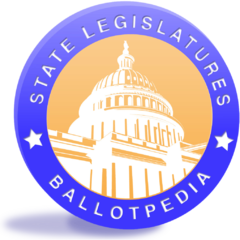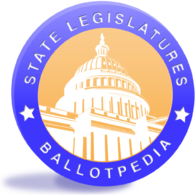Georgia state legislative special elections, 2021
Special state legislative • Local ballot measures • School boards • Municipal • How to run for office |
2022 →
← 2020
|
Special Elections |
|
|
|
Alabama • California • Connecticut • Georgia |
| Other 2021 Election coverage |
State legislative elections Gubernatorial elections • Ballot measures |
In 2021, four special elections were called to fill vacant seats in the Georgia General Assembly in 2021. Click here to read more about the special elections.
House special elections called:
- District 90: March 9
- District 34: June 15
- District 156: June 15
- District 165: November 2
How vacancies are filled in Georgia
If there is a vacancy in the Georgia General Assembly, the vacant seat must be filled by a special election. If the vacancy occurs during a legislative session, the governor must declare a special election no later than 10 days after the vacancy happens. If the vacancy occurs after the regular legislative session held during the first year of the term of office for members, the governor may order a special election at any time but no later than 60 days before the November general election. If the vacancy occurs between 60 days before the November general election and the next legislative session, the governor is required to order a special election within 10 days.[1]
The special election must be held no less than 30 days and no later than 60 days after the governor calls for the election. The counties representing the vacant district are responsible for conducting the election.[1]
See sources: Georgia Code § 21-2-544
About the legislature
The Georgia General Assembly is a bicameral body composed of the Georgia House of Representatives, with 180 members, and the Georgia State Senate, with 56 members. The boxes below show the partisan composition of both chambers directly before and after the November 2020 general election. For the most up-to-date numbers on partisan composition in this legislature, see here (Senate) and here (House).
| Georgia State Senate | |||
|---|---|---|---|
| Party | As of November 3, 2020 | After November 4, 2020 | |
| Democratic Party | 21 | 22 | |
| Republican Party | 35 | 34 | |
| Total | 56 | 56 | |
| Georgia House of Representatives | |||
|---|---|---|---|
| Party | As of November 3, 2020 | After November 4, 2020 | |
| Democratic Party | 75 | 76 | |
| Republican Party | 104 | 103 | |
| Vacancy | 1 | 1 | |
| Total | 180 | 180 | |
Special elections
Click [show] to the right of the district name for more information:
March 9, 2021
| Georgia House of Representatives District 90 | |||||||||||||||||||||||||||||||||||||||||||||||||||||||||||||||||||||||||||||||||||||||
|---|---|---|---|---|---|---|---|---|---|---|---|---|---|---|---|---|---|---|---|---|---|---|---|---|---|---|---|---|---|---|---|---|---|---|---|---|---|---|---|---|---|---|---|---|---|---|---|---|---|---|---|---|---|---|---|---|---|---|---|---|---|---|---|---|---|---|---|---|---|---|---|---|---|---|---|---|---|---|---|---|---|---|---|---|---|---|---|
|
A special Democratic primary election for Georgia House of Representatives District 90 was called for February 9, 2021. Since the Democratic incumbent was re-elected in 2020 without opposition, only a Democratic primary was held to fill the vacant seat. A primary runoff took place on March 9, 2021. The candidate filing deadline was December 18, 2020.[2] The seat became vacant after Pam Stephenson (D) resigned her seat on September 4, 2020.[3] Democratic primary runoff electionSpecial Democratic primary runoff for Georgia House of Representatives District 90Angela Moore defeated Stan Watson in the special Democratic primary runoff for Georgia House of Representatives District 90 on March 9, 2021.
Democratic primary electionSpecial Democratic primary for Georgia House of Representatives District 90The following candidates ran in the special Democratic primary for Georgia House of Representatives District 90 on February 9, 2021.
Withdrawn or disqualified candidates
| |||||||||||||||||||||||||||||||||||||||||||||||||||||||||||||||||||||||||||||||||||||||
June 15, 2021
| Georgia House of Representatives District 34 | ||||||||||||||||||||||||||||||||||||||||||||||||||||||||||||||||||||||||||||||||||
|---|---|---|---|---|---|---|---|---|---|---|---|---|---|---|---|---|---|---|---|---|---|---|---|---|---|---|---|---|---|---|---|---|---|---|---|---|---|---|---|---|---|---|---|---|---|---|---|---|---|---|---|---|---|---|---|---|---|---|---|---|---|---|---|---|---|---|---|---|---|---|---|---|---|---|---|---|---|---|---|---|---|---|
|
A special election for District 34 of the Georgia House of Representatives was called for June 15, 2021. A general runoff took place on July 13, 2021. The candidate filing deadline was May 7, 2021. The seat became vacant on April 30, 2021, after Bert Reeves (R) resigned to become Georgia Institute of Technology's vice president of university relations.[4] General runoff electionSpecial general runoff election for Georgia House of Representatives District 34Devan Seabaugh defeated Priscilla Smith in the special general runoff election for Georgia House of Representatives District 34 on July 13, 2021.
General electionSpecial general election for Georgia House of Representatives District 34Devan Seabaugh and Priscilla Smith advanced to a runoff. They defeated Sam Hensley Jr., David Blinkhorn, and Chris Neill in the special general election for Georgia House of Representatives District 34 on June 15, 2021.
| ||||||||||||||||||||||||||||||||||||||||||||||||||||||||||||||||||||||||||||||||||
| Georgia House of Representatives District 156 | ||||||||||||||||||||||||||||||||||||||||||||||||||||||||||||||||||||||||
|---|---|---|---|---|---|---|---|---|---|---|---|---|---|---|---|---|---|---|---|---|---|---|---|---|---|---|---|---|---|---|---|---|---|---|---|---|---|---|---|---|---|---|---|---|---|---|---|---|---|---|---|---|---|---|---|---|---|---|---|---|---|---|---|---|---|---|---|---|---|---|---|---|
|
A special election for District 156 of the Georgia House of Representatives was called for June 15, 2021. A general runoff took place on July 13, 2021. The candidate filing deadline was May 7, 2021. The seat became vacant on April 13, 2021, after Greg Morris (R) resigned to join the Georgia Department of Transportation's State Transportation Board.[5] General runoff electionSpecial general runoff election for Georgia House of Representatives District 156Leesa Hagan defeated Wally Sapp in the special general runoff election for Georgia House of Representatives District 156 on July 13, 2021.
General electionSpecial general election for Georgia House of Representatives District 156Leesa Hagan and Wally Sapp advanced to a runoff. They defeated Wright Gres in the special general election for Georgia House of Representatives District 156 on June 15, 2021.
| ||||||||||||||||||||||||||||||||||||||||||||||||||||||||||||||||||||||||
November 2, 2021
| Georgia House of Representatives District 165 | |||||||||||||||||||||||||||||||||||||||||||||||||
|---|---|---|---|---|---|---|---|---|---|---|---|---|---|---|---|---|---|---|---|---|---|---|---|---|---|---|---|---|---|---|---|---|---|---|---|---|---|---|---|---|---|---|---|---|---|---|---|---|---|
|
A special election for District 165 of the Georgia House of Representatives was called for November 2, 2021. A general runoff was scheduled for Nov. 30 but was not needed after Edna Jackson (D) won the election outright in the Nov. 2 special election. The candidate filing deadline was September 10, 2021.[6] The seat became vacant on August 14, 2021, after Edward Stephens (D) passed away.[7] General electionSpecial general election for Georgia House of Representatives District 165Edna Jackson defeated Antwan Lang, Clinton Cowart, Clinton Young, and Sabrina Kent in the special general election for Georgia House of Representatives District 165 on November 2, 2021.
| |||||||||||||||||||||||||||||||||||||||||||||||||
Historical data
There were 782 state legislative special elections that took place from 2010 to 2020. Georgia held 67 special elections during the same time period; the most of any state. About six special elections were held each year on average. The largest number of special elections in Georgia took place in 2015 when 12 special elections were held.
The table below details how many state legislative special elections were held in a state in a given year.
Special elections throughout the country
In 2021, 66 state legislative special elections were held in 21 states. Between 2011 and 2020, an average of 75 special elections took place each year.
Breakdown of 2021 special elections
In 2021, special elections for state legislative positions were held for the following reasons:
- 27 due to appointment, election, or the seeking of election to another position
- 23 due to resignation
- 4 due to a resignation related to criminal charges
- 12 due to the death of the incumbent
Impact of special elections on partisan composition
The partisan breakdown for the special elections was as follows:
- 33 Democratic seats
- 33 Republican seats
The table below details how many seats changed parties as the result of a special election in 2021. The number on the left reflects how many vacant seats were originally held by each party, while the number on the right shows how many vacant seats each party won in the special elections. In elections between 2011 and 2020, either the Democratic Party or Republican Party saw an average net gain of four seats across the country.
Note: This table reflects information for elections that were held and not the total number of vacant seats.
| Partisan Change from Special Elections (2021) | |||
|---|---|---|---|
| Party | As of Special Election | After Special Election | |
| Democratic Party | 33 | 33 | |
| Republican Party | 33 | 33 | |
| Independent | 0 | 0 | |
| Total | 66 | 66 | |
Flipped seats
In 2021, six seats flipped as a result of state legislative special elections.
Seats flipped from D to R
- Connecticut State Senate District 36 (August 17)
- Iowa House of Representatives District 29 (October 12)
- Texas House of Representatives District 118 (November 2)
Seats flipped from R to D
- New Hampshire House of Representatives District Hillsborough 7 (September 7)
- Maine House of Representatives District 86 (November 2)
- Massachusetts House of Representatives Fourth Essex District (November 30)
See also
- State legislative special elections, 2021
- State legislative special elections, 2020
- State legislative special elections, 2019
- State legislative special elections, 2018
- State legislative special elections, 2017
- State legislative special elections, 2016
- Georgia General Assembly
Footnotes
- ↑ 1.0 1.1 The State of Georgia, "Official Code of Georgia," accessed January 23, 2024 (Statute 21-2-544)
- ↑ Georgia Secretary of State, "SPECIAL DEMOCRATIC PRIMARY ELECTION SET FOR GEORGIA STATE HOUSE DISTRICT 90," accessed December 17, 2020
- ↑ AJC, "Lithonia Democratic lawmaker resigns from Georgia House," September 15, 2020
- ↑ Marietta Daily Journal, "Reeves to resign from General Assembly, become Georgia Tech executive," April 22, 2021
- ↑ The Augusta Chronicle, "Rep. Greg Morris named to replace Don Grantham on GDOT board; former commissioner not pleased," March 25, 2021
- ↑ Georgia Secretary of State, "SPECIAL ELECTION SET FOR GEORGIA HOUSE DISTRICT 165," September 6, 2021
- ↑ Savannah Morning News, "Georgia House Rep. Mickey Stephens of Savannah dies at age 77: 'A man of quiet strength'," August 14, 2021
| |||||||||||
State of Georgia Atlanta (capital) | |
|---|---|
| Elections |
What's on my ballot? | Elections in 2025 | How to vote | How to run for office | Ballot measures |
| Government |
Who represents me? | U.S. President | U.S. Congress | Federal courts | State executives | State legislature | State and local courts | Counties | Cities | School districts | Public policy |


